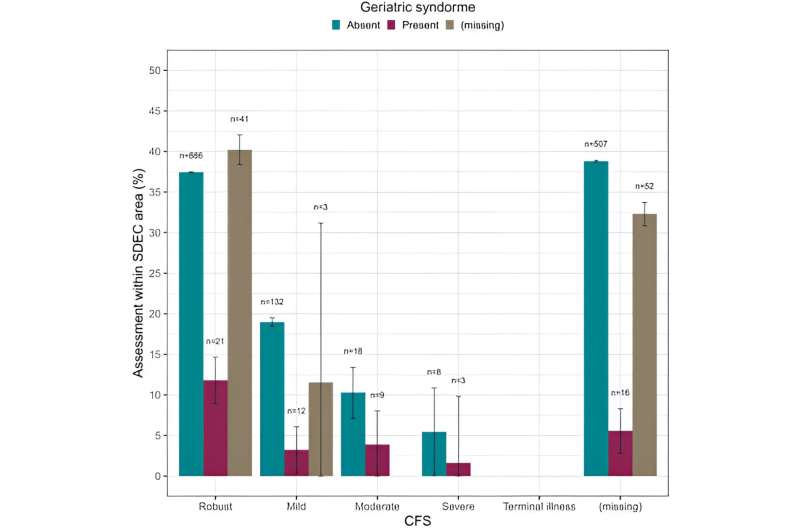This article has been reviewed according to Science X's editorial process and policies. Editors have highlighted the following attributes while ensuring the content's credibility:
fact-checked
peer-reviewed publication
trusted source
proofread
New study shows older and frail patients wait longer for emergency hospital care than younger patients

A new study by the University of Warwick working with the Society for Acute Medicine has found that younger patients with simpler problems are waiting less time for assessments than frail patients with complex care needs.
The study, published in eClinicalMedicine, has found this is due to the NHS England policy of same day emergency care (SDEC). SDEC involves attempting to discharge as many patients with acute medical problems as possible on the same day without being admitted to a ward and is a major policy of NHS England.
This means care targets are being missed for older and frail patients. The study also found that the worst time to need medical assessment in hospital was 4 pm–8 pm when the time targets were least likely to be met.
The study showed that:
- Frail patients are waiting longer for emergency care than fitter ones, with the frailer a patient was, the more likely they were to have to wait longer for care.
- Patients with "geriatric syndromes"—a term for conditions mainly seen in frail older adults where illness can cause problems such as confusion or reduced mobility and falls—were less likely to be assessed within four hours than patients without these syndromes.
- The study found no other reason besides age to explain these findings, with no risk measures—such as blood pressure or temperature—suggesting patients without geriatric syndromes needing seeing more urgently.
- Across the day, less than 35% of patients with a geriatric syndrome were seen within the four-hour target.
Professor Lasserson, lead researcher and Professor of Acute Ambulatory Care at The University of Warwick, commented, "The data from this study shows a concerning trend across the NHS. Hospitals may not be giving equal priority to our frail and older patients and are favoring younger patients with simpler needs who can be assessed and treated more quickly.
"We conclude that this is a result of the NHS England drive for SDEC which prioritizes patient flow through SDEC units, involving quicker care for younger patients. This results in slower care for our older, more frail patients who will inevitably require longer, more complex assessments."
A total of 152 hospitals provided patient level data relating to 7,248 emergency medical admissions. The Clinical Frailty Scale (CFS) was used to assess patients' levels of frailty.
Dr. Tim Cooksley, immediate past president of the Society for Acute Medicine, said, "This important study is a further illustration of the tremendous strain that the urgent and emergency care (UEC) is under.
"We know that older patients are more likely to experience degrading corridor care and this data illustrates that with further delays to important components of their care. This increases the likelihood of adverse outcomes.
"We desperately need increased capacity and workforce in the UEC system. We need to ensure timely transfer of patients to acute medical units and acute frailty units so these patients can receive the high quality care they deserve and that our teams wish to deliver.
"Importantly, this requires urgent support for the large numbers of older patients who wish to be at home but whose discharge is delayed due to lack of workforce in the social care system or timely access to high quality rehabilitation facilities.
"We are heading for more extremely troubled times in the NHS. We are all desperately concerned that the winter months are likely to be similar to the appalling scenes witnessed last year. Older people are particularly vulnerable.
"Clinical staff and patients remain energized to avert this: Governments must follow suit."
More information: Thomas Knight et al, The impact of frailty and geriatric syndromes on metrics of acute care performance: results of a national day of care survey, eClinicalMedicine (2023). DOI: 10.1016/j.eclinm.2023.102278


















